LifeBio captures life stories for better health and improves social connectedness. LifeBio also builds loneliness interventions and agetech solutions to help people living with Alzheimer's and their caregivers. Our latest research and publications are below. LifeBio is an evidence-informed solution.
For more on Research on Life Story Work & the Power of Life Stories for Better Health click here.
LifeBioBRAIN Publication Link -- Usable cognitive screening prototype.
https://bmcdigitalhealth.biomedcentral.com/articles/10.1186/s44247-024-00123-7
LifeBioMEMORY Presentations at Gerontological Society of America
(PDF) IMPLEMENTATION OF LIFE STORY TECHNOLOGY IN RESIDENTIAL CARE SETTINGS: BENEFITS AND BARRIERS (researchgate.net)
INVOLVING PERSONS LIVING WITH DEMENTIA AS KEY STAKEHOLDERS: RESEARCH “WITH” RATHER THAN RESEARCH “ON” - PMC (nih.gov)
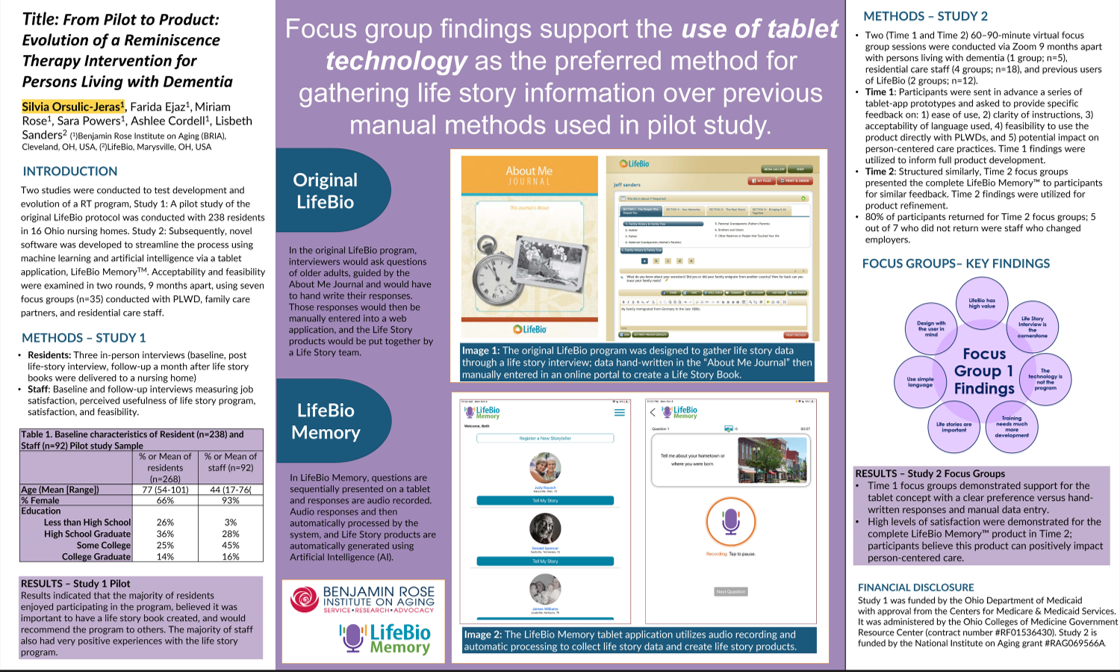
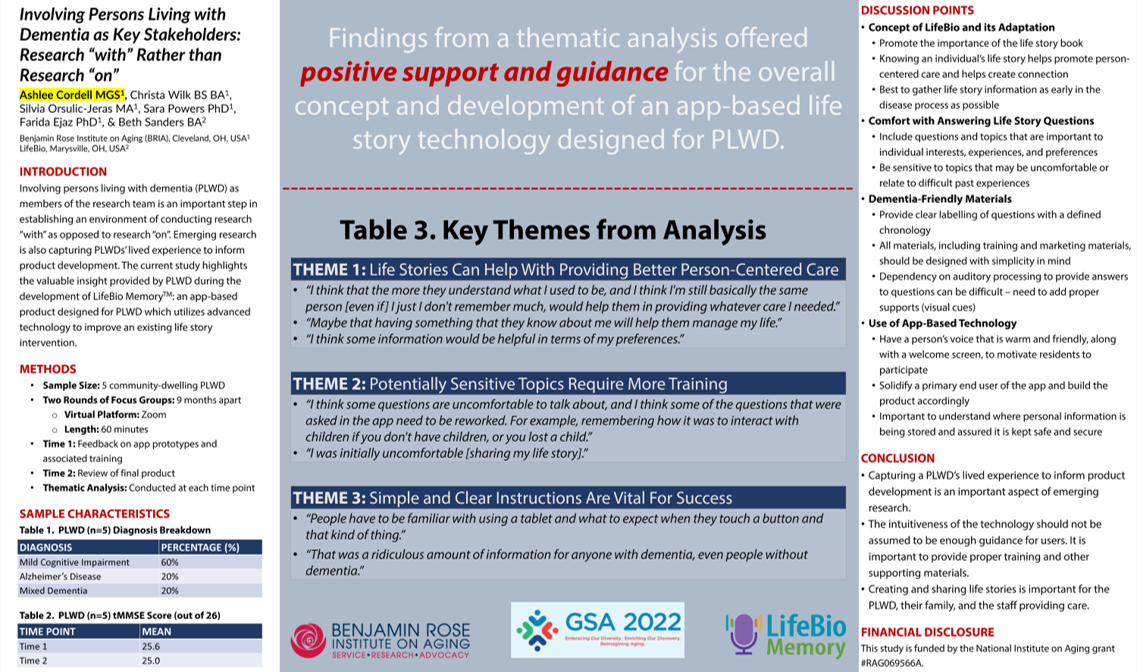
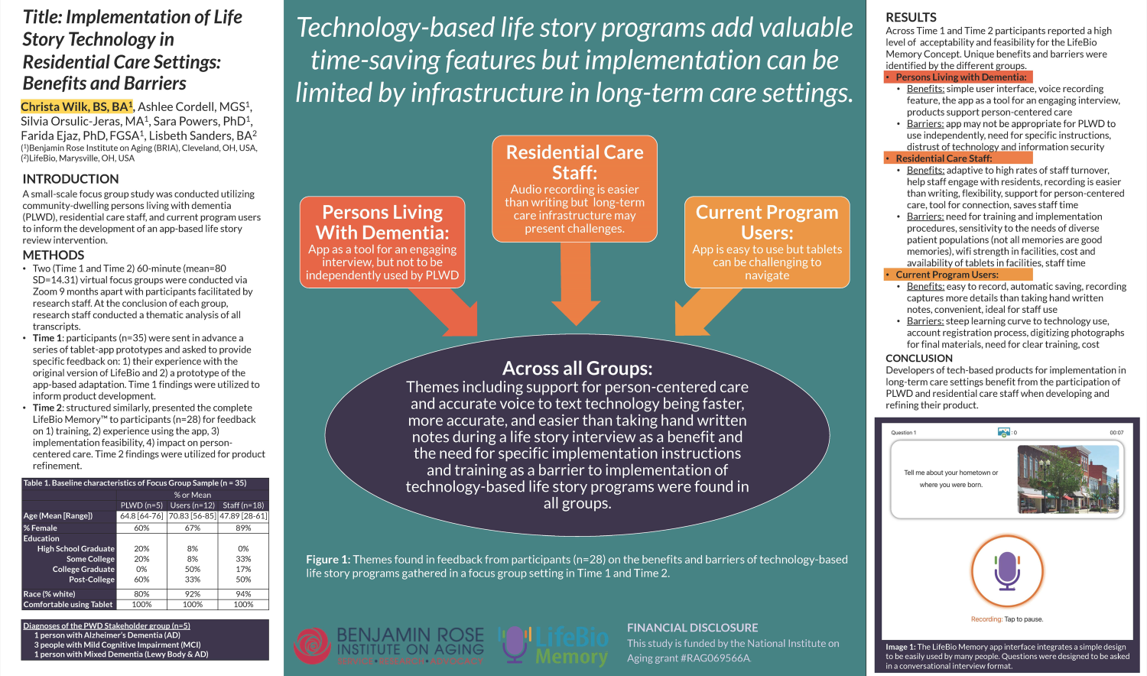
LONELINESS REDUCED + IMPROVED LIFE SATISFACTION / SUBJECTIVE HAPPINESS (PEER TO PEER / LIFEBIO INTERVENTION) - PRESENTED AT GERONTOLOGICAL SOCIETY OF AMERICA 2022
“Those lonely at baseline showed significant improvement in life satisfaction, subjective happiness, and reduced loneliness.” For people lonely at baseline, a statistically significant improvement was found from 26.9 at baseline (T1), to 24.88 (at 90-day mark, T2), to 24.34 (at 180-day mark, T3). Life stories/reminiscence were at the heart of this innovative LifeBio intervention.

LifeBio and health plans (and other providers) are reporting positive outcomes on innovative approaches to help address loneliness and social isolation using research-backed engagement and life story work methods. Resilience, optimism, purpose, and social connectedness are resulting from tech-powered interventions and face-to-face engagements. LifeBio and MyHello's tech-powered phone interventions move the needle to reduce loneliness (a major health risk).
As a loneliness intervention implemented by major health plans, here is an article that shares how loneliness and social isolation impacts overall health costs and health outcomes. Full article: Cumulative effect of loneliness and social isolation on health outcomes among older adults (tandfonline.com)
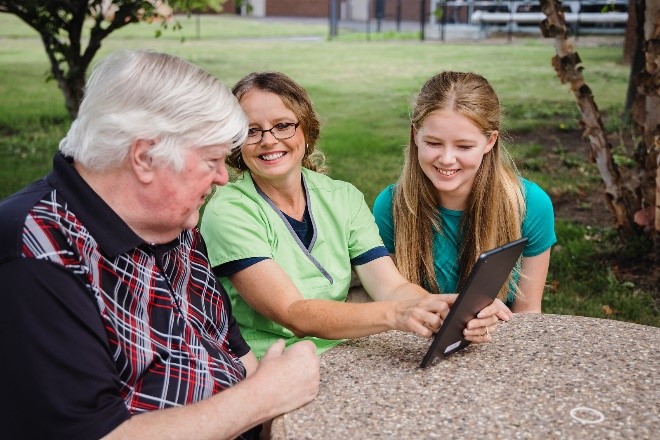
Positive Psychosocial Protective Factors (PDoH) and Increasing Social Connection to Reduce Loneliness Makes a Difference – Lowering Cost of Health Care Significantly
LifeBio (life story work online or face to face in care settings) & MyHello (live phone-based social engagement using our life story work methods) are concrete ways to increase protective factors.
A 2021 study from UnitedHealthcare and AARP finds that there is $1,356 saved per year per person for each psychosocial protective factor (Personal Determinants of Health - PDoH). Protective factors include resilience, social connectedness, etc. See more here:
Return on Investment by addressing Personal Determinants of Health
An AARP report on Medicare members found...
35% are low on purpose -- costing 12% more PMPM
19% are lonely -- costing 20% more PMPM
40% have a negative perception of aging -- costing 33% more PMPM
LifeBio (online/app) and MyHello (tech-powered using any phone) build stronger feelings of purpose and resilience, while reducing loneliness using life stories for better health.
Telephonic Solutions for Medicare Members
Research from group interactions within a health plan led to positive outcomes from life story work as well. See published study information here: LIFEBIO: PARTICIPANTS' EXPERIENCES IN A TELEPHONIC-BASED REMINISCENCE PROGRAM | Innovation in Aging | Oxford Academic (oup.com)
The LifeBio Project - Decreased Depression in Nursing Homes, Helped Staff Deliver Care
The LifeBio Project was implemented and evaluated in a pilot study in 16 Ohio nursing homes funded by the Ohio Department of Medicaid. This is one of the largest studies of life story work in the United States to date.
"Life story programs hold promise for improving person-centered care and relationships between nursing home residents and staff. A pilot life story intervention study in 16 nursing homes provided residents with complimentary biographical life story books and summaries, and staff with action plans to enhance care planning. Trained volunteers and program staff collected life stories, and researchers interviewed 170 residents at three points in time. Overall, residents had positive experiences with the program, but were less willing to share their books with others afterwards. They also experienced a decrease in depression (Patient Health Questionnaire-8 [PHQ-8]) over time. Surveys of 92 staff demonstrated increases over time in perceived importance of knowing residents’ life stories. Administrator/admissions staff found it conditionally feasible to incorporate the program into admission processes. Practice implications of life story work include opportunities to help staff learn more about residents they care for, improve person-centered care, and honor resident preferences in care planning."
https://journals.sagepub.com/doi/abs/10.1177/07334648211008682?journalCode=jaga
Intergenerational Impact: Here are some reactions to college student interns who participated in the LifeBio Project.
Increasing Quality of Care, Making Delivering Care More Enjoyable for Memory Care Staff
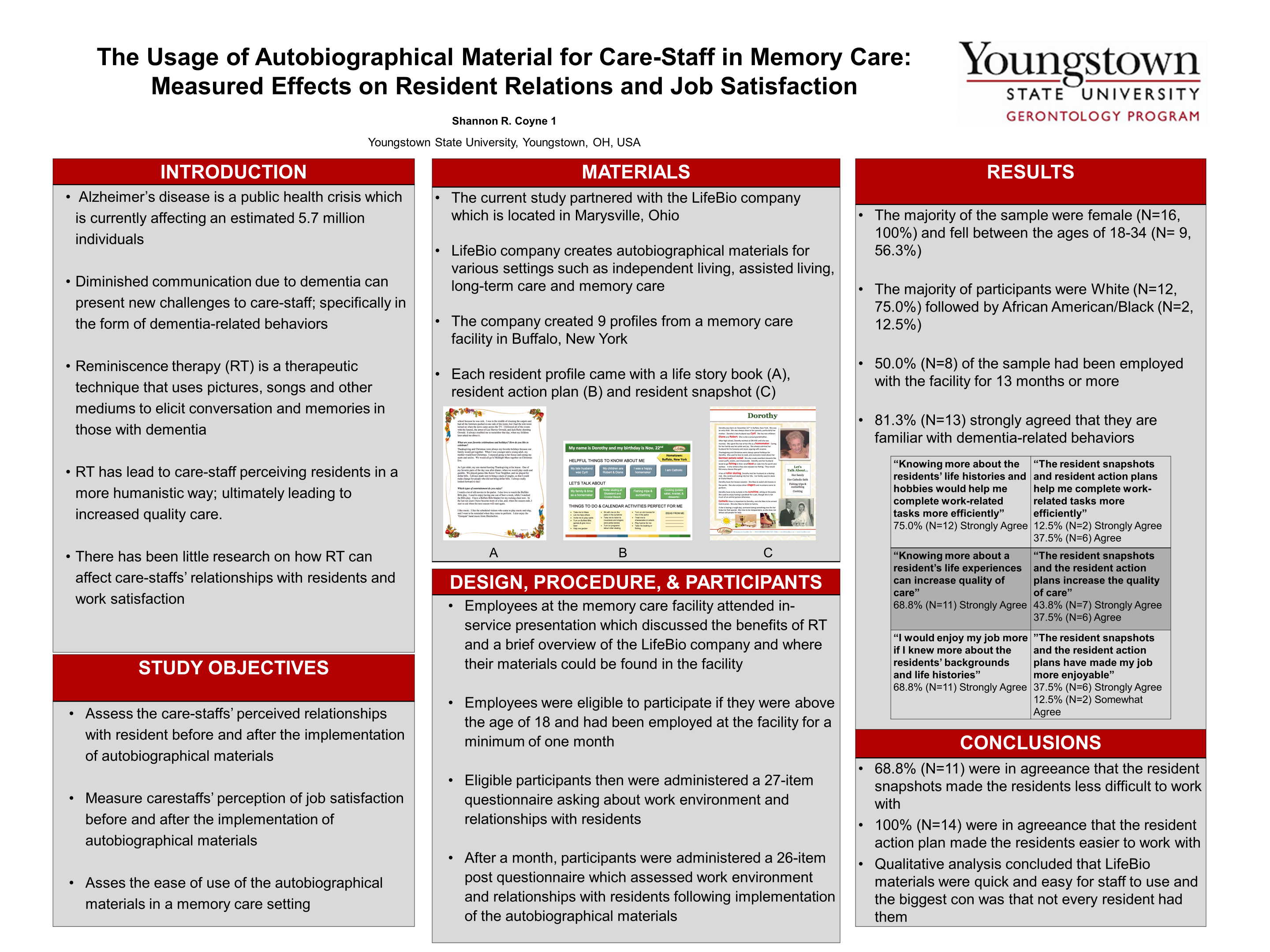
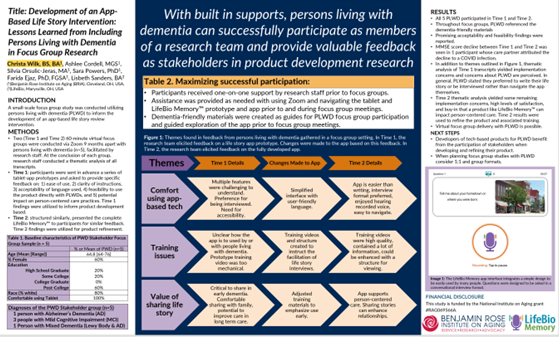
Increasing Happiness and Satisfaction with Life (Subjective Wellbeing)
The use of LifeBio was found to result in a statistically significant increase in happiness and satisfaction with life for people over age 65. This study was done in a GROUP of seniors who were engaging with each other to communicate their stories together with the research done by Iowa State University.
Happiness and Satisfaction with Life

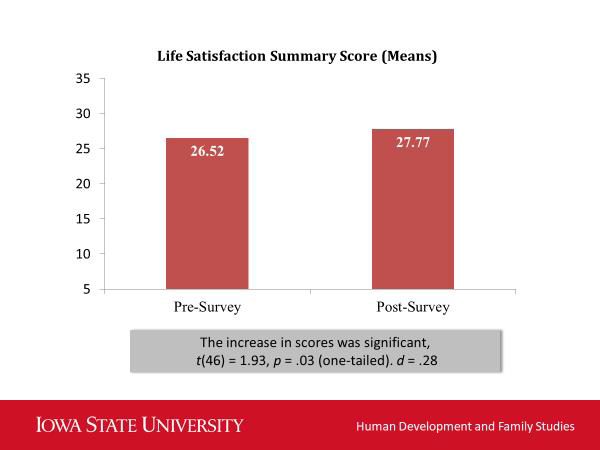
Mayo Clinic
LifeBio has been used in a program for individuals with MCI (mild cognitive impairment) and their care partners (HABIT: Healthy Action to Benefit Independence & Thinking®). LifeBio's reminiscence questions are used during the Support Group hour of the program with those living with MCI as a therapeutic tool. Reminiscence helps provide the group members with a sense of success, a way to bond with each other, and a chance to rehearse and reinforce their most precious memories during a time of episodic memory loss. Reminiscence provides a tool to allow for success and meaningful interaction, something that is often sorely needed. “Reminiscence provides a tool to allow for success and meaningful interaction, something that is often sorely needed.” Researcher at Mayo Clinic
In 1963, Dr. Robert Butler first documented the natural, therapeutic value of reminiscence. He was the founding director of the National Institute on Aging (NIA), and he later helped found the Alzheimer’s Association. Dr. Butler considered reminiscence to be one of the most natural and productive processes of older people who are coming to terms with their own lives (Butler, 1963).
LifeBio Memory Focus Groups (Time 1) Feedback - Presented at Alzheimer's Association International Conference 2021 by Benjamin Rose Institute on Aging (Note: feedback from people living with dementia and other participants helped us advance the training offered inside the app). 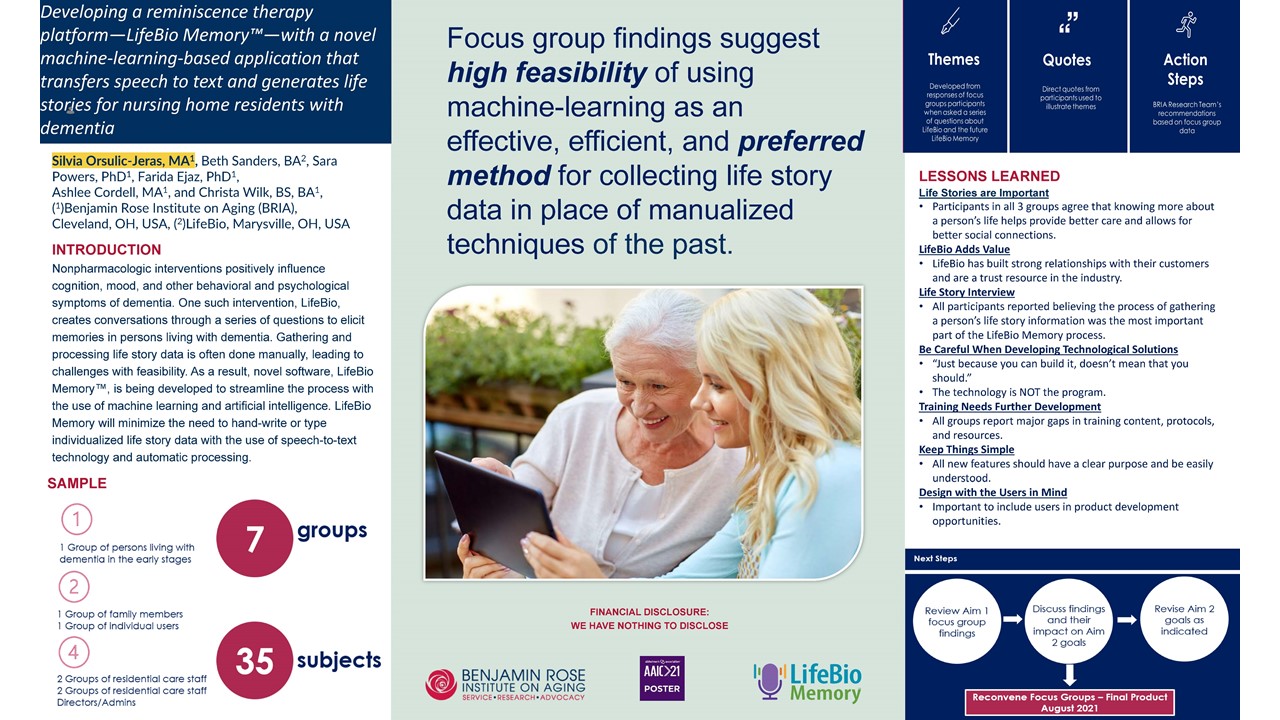
For more on Research on Life Story Work & the Power of Life Stories for Better Health click here.
For more on Costly Aging Issues (Loneliness, Depression, Alzheimer's), click here.